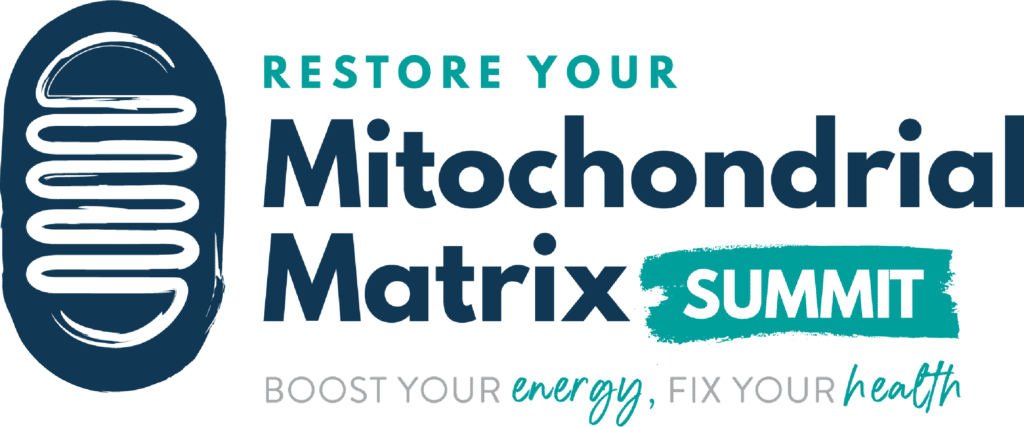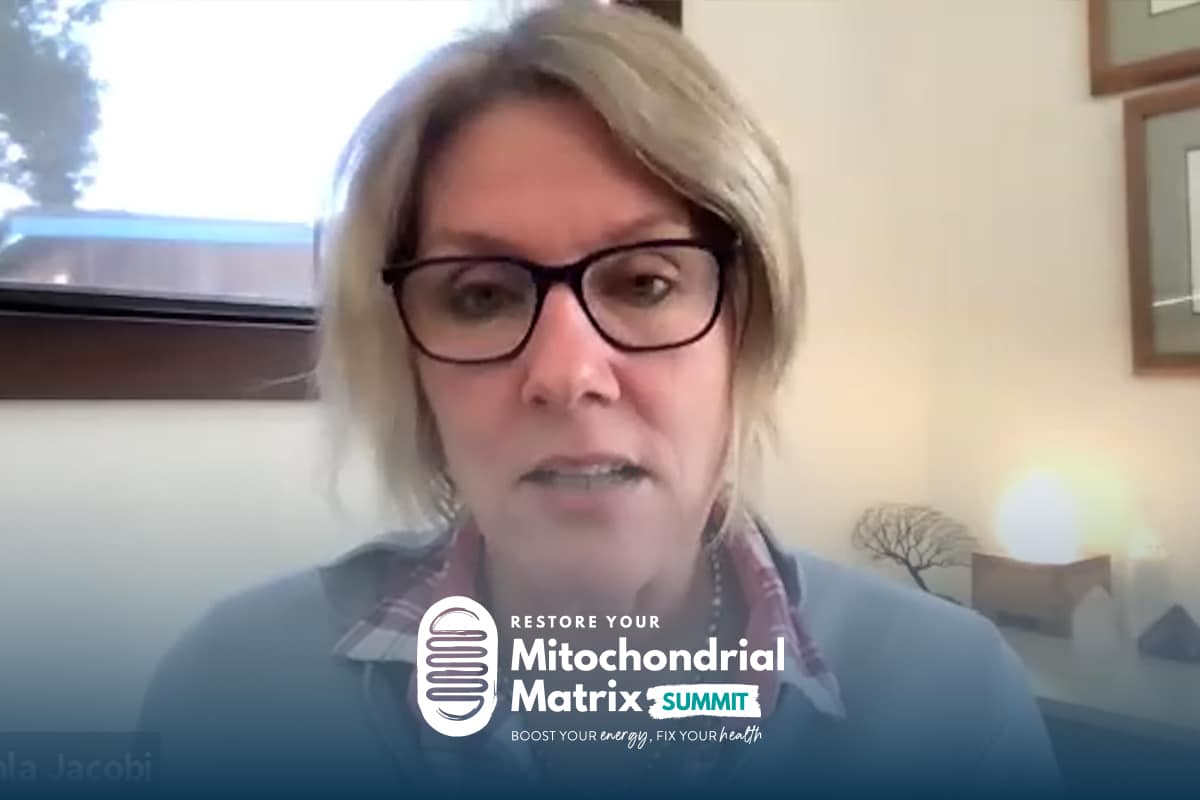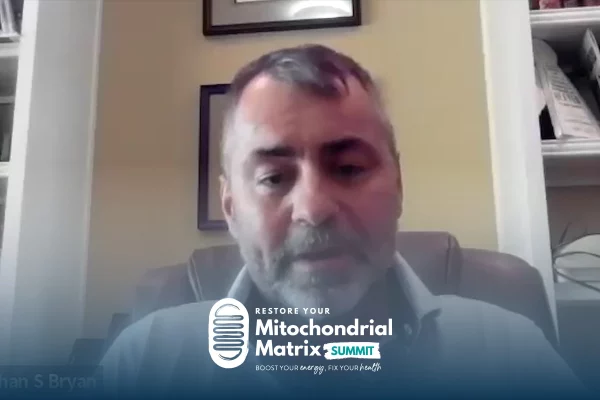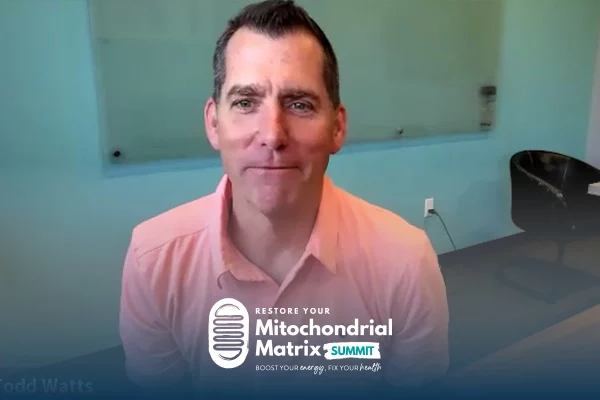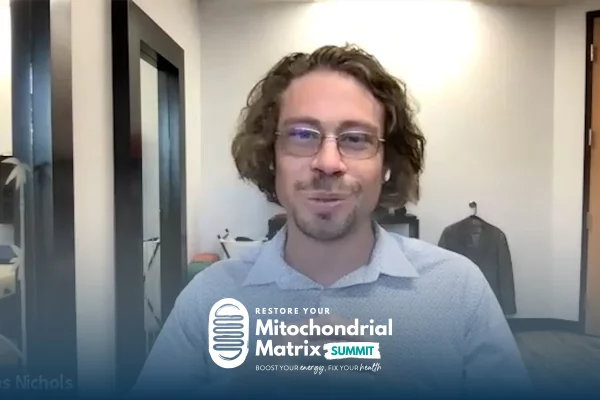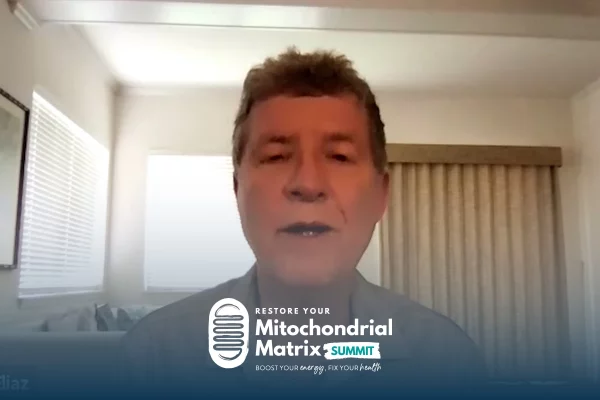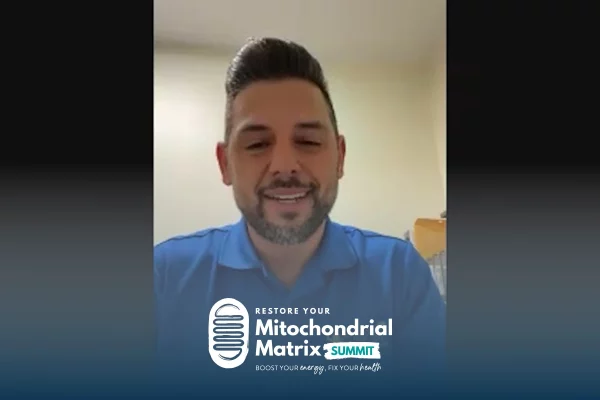Join the discussion below

Laura Frontiero, FNP-BC, has served thousands of patients as a Nurse Practitioner over the last 22 years. Her work in the health industry marries both traditional and functional medicine. Laura’s wellness programs help her high-performing clients boost energy, renew mental focus, feel great in their bodies, and be productive again.... Read More

Dr. Nirala Jacobi is a naturopathic doctor (ND) and internationally recognized expert on small intestinal bacterial overgrowth (SIBO). She is the creator of the SIBO Biphasic Diet, a resource that has helped tens of thousands of SIBO sufferers around the world. Dr. Jacobi is the host of The SIBO Doctor... Read More
- Why healthy mitochondria are important for gut health
- How the gut impacts mitochondrial healing
- Nutrient deficiencies and fatigue
- SIBO, IBS, and leaky gut– underlying drivers of whole body fatigue
Related Topics
Autoimmunity, Autoimmunity Connection, Bart Simpson Cells, Brain, Brain Fog, Brain Function, Cellular Energy, Cellular Repair, Cognitive Decline, Digestive Disorders, Digestive Tract, Fatigue, Gut Health, Gut Microbiome, Immune Response, Inflammation, Intestinal Permeability, Iron Absorption, Joint Inflammation, Leaky Gut, Leaky Gut Definition, Mitochondria, Nutrient Deficiency, Rashes, Sibo, Small Intestinal Bacterial Overgrowth, Systemic Fatigue, Systemic Pain, ZonulinLaura Frontiero, FNP-BC
Welcome back to the conversation at the Restoring your Mitochondrial Matrix Summit. I’m your host, Laura Frontiero. I’m bringing you experts to help you boost your energy and fix your health so you can build the life you love. And today my special guest is a fan favorite. Dr. Nirala Jacobi. Hi, Nirala, welcome to the summit.
Dr. Nirala Jacobi
Nice talking to you again, Laura.
Laura Frontiero, FNP-BC
Yeah, I am so pleased to have you here because you are a world expert in SIBO, gut health, but SIBO is really where you’ve made your mark in the world. And this is really important to the conversation of mitochondria. So we’re gonna get into how, how the gut impacts mitochondria healing and what SIBO has to do with all of this. Now you’re a naturopathic doctor and you’re an internationally recognized expert on SIBOs, Small Intestinal Bacterial Overgrowth, and you’re the creator of the SIBO biphasic diet, which I’ve used in my clients in the past. And you have a resource that’s helped tens of thousands of SIBO sufferers around the world. I mean, we’re all using it. You’re in Australia, I’m in the United States and we use your biphasic diet. It’s great. And you host a podcast, the SIBO Doctor podcast, and you’re a founder of the SIBO Doctor, which is an online educational platform. And it has a practitioner certification program as well. And you’re the medical director of SIBO Test, which provides testing options for SIBO and IBS. So when it comes to SIBO, you are the resource, it sounds like.
Dr. Nirala Jacobi
Yeah, it’s been, it’s been a really interesting 10 years of really immersing myself in SIBO research and really figuring out what really works for people. And I also have a clinic where I see patients. So I kind of have my fingers and all sorts of different pies that are SIBO and gut related. So, yeah, and there is a lot of connection between systemic fatigue and digestive disorders in particular with SIBO. A lot of my patients are very fatigued, so it’s a good topic I think.
Laura Frontiero, FNP-BC
Man, and SIBO is such a pesky thing. You think you got it? And then it comes back on people and shows up again. And so let’s dig into this and really talk about what this is all about and how we can help people. And why would I bring a SIBO expert onto the mitochondria summit? So why are mitochondria important for gut health?
Dr. Nirala Jacobi
Well, actually, let’s start with the fact that the small intestine, which is right under your stomach or starts after your stomach and it goes all the way to the large intestine. The large intestine is sort of where the majority of your microbiome is supposed to live. And your small intestine is really where you turn food that you’re eating into yourself. Like you are actually transforming, foods that you eat into energy that the body needs and your entire digestive tract has a lining of cells that if I were to take it out of your body and stretch it out, it would be about the surface area of a double tennis court. So it’s a massive surface area, that’s supposed to interact with the food and digest it and absorb it. And, you know, like I said, you are absorbing your nutrients. Now every five days you are replacing that tennis court of cells and what drives that is basically the fact that those cells, like I said, are very important in interacting with your immune system in the microbiome and what drives the cellular replication and the cellular, where the mitochondria is really the fact that you are replacing those cells. So I think that mitochondrial health is really key for the gut because it requires a lot of energy to replace these cells every five days. So if you’re getting really fatigued and you have leaky gut, and you have digestive disorders, that kind of goes hand in hand because your body needs to prioritize the cells of the digestive tract to be replaced. And so all that energy goes into replacing those digestive cells.
Laura Frontiero, FNP-BC
Oh, this is fascinating. Of all the speakers that I have on this summit, there’s close to 70, this is the first time somebody has said, by the way you replace those cells every five days. That requires a heck of a lot of cellular energy to make that happen. Wow.
Dr. Nirala Jacobi
Yeah, and think about, I think every cell has something like 2000 mitochondria or more, right? There’s like thousands of these mitochondria. And if you think about how many millions of cells need to be replaced, that requires a lot of folic acid, for DNA replication. And so it’s a very nutrient intensive process and it needs to be healed all the time because your immune system is right underneath that single cell layer that basically separates yourself from the outside world. We consider the digestive tube to be actually the outside world, ’cause you’re bringing the food in and you’re pooing it out the other and you’re the outside of the tube is actually you and that’s where your immune system samples constantly goes into the digestive tract and just samples, what you’re eating and tells the immune system, this is safe. You don’t have to react to this. We can use this. And so it is a super intensive process that requires a lot of mitochondrial energy.
Laura Frontiero, FNP-BC
Yeah, then even on the, so you need mitochondria to repair and restore and replace cells in your gut microbiome, in your intestinal tract. And then also the gut impacts mitochondrial healing, so it’s a kind of a relationship there. So unpack that for us because without gut health, you don’t have a healthy mitochondria either.
Dr. Nirala Jacobi
Well, if you think about all the nutrients that are required for the mitochondria, we see a lot of B vitamins and certain co-factors of minerals that drive this, this sort of chain that goes through the mitochondria, I’m sure you’ve had other speakers talk about the KREB cycle or the TCA cycles, different names. And it’s basically redox reactions and different sort of energy that goes into this in order to produce more energy or the ATP at the end. So that requires a lot of nutrients. And when you have CBO or leaky gut or your digestion is impaired, then you are not absorbing a lot of the nutrients that you actually require for these cellular repair processes. So I think that’s one reason we see a lot of fatigue in people that have chronic gut issues. Another reason is not so much related to mitochondria, but when you have SIBO, for example, which is a bacterial overgrowth in the small intestine, your body produces, or your liver produces a protein that prevents iron absorption so that you actually stop feeding bacteria, ’cause bacteria do feed on iron and chronic iron deficiency, which is of course one reason, big reason why particularly women have a lot of fatigue because we also bleed every month and lose a lot of iron. So replacing that iron in people with SIBO can be really impaired. So that’s another reason that I see that’s very common, why people are very fatigued. There’s lots of reasons why people are fatigued, but mitochondrial repair is one of them.
Laura Frontiero, FNP-BC
Oh, wow, okay. So now that we’ve established that mitochondria is really deeply connected to your gut microbiome and that SIBO and IBS can contribute to mitochondria fatigue for various nutrient deficiency reasons, let’s do a good definition of what is leaky gut. Can you explain it to our audience?
Dr. Nirala Jacobi
Sure, like this is, this is one of my favorite topics because it’s so relevant to so many different chronic conditions that we see in our practices. So when you think about what I said before is that you have this single cell lining that completely covers the surface of your small intestine. And this is where, like I said, you have to actually absorb nutrients. When you think about the cells, think about cells that kind of look like Bart Simpson. They have little hairs on top, that’s the microvilli, right? And the microvilli is there to absorb micronutrients and to also release what we call brush border enzymes, which are the last step of of digestion, where we break down dye peptides into single amino acids. And we break down fatty acids and also carbohydrates and bring them across. So the single, like sort of hairlike structures are often damaged as well. But if you think about these Bart Simpson cells that are just like the head of Bart Simpson, that are zipped together, right? So if you can imagine these are two cells that have their little hair on top and they zip together with something called Zonulin, right?
So Zonulin is a structure that ensures that the passage between cells is really tight because if anything comes across, so undigested foods or God forbid microbes or anything, the immune system immediately sounds the alarm because it’s right below that surface. So leaky gut is where it’s also known as intestinal permeability is where the Bart Simpson cells have gaps in them. And so bigger molecules can come through and actually initiate an immune response. And so all of a sudden your immune system goes, what the heck is going on? We’ve got all these big proteins coming through. We’ve got this undigested food and inflammation ensues. And so it’s sort of a multisystem process of leaky gut. Leaky gut can affect your brain function. It can affect, joints can become inflamed. We see rashes, we see, cognitive decline or confusion and brain fog. We see systemic pain. We can see all sorts of symptoms that you would never think to kind of associate with leaky gut. A big one of course is autoimmunity. Because why, as I just mentioned, when you have this sort of activation of your immune system, that’s difficult to switch off when this process continues, we do see a big connection between autoimmunity and leaky gut.
Laura Frontiero, FNP-BC
Yeah. Now I know that this all starts up top when we’re digesting food, right? So this whole leaky gut situation, it begins right from the moment that we eat. So can you talk a little bit about that? Because stomach acid is so important and nutrients are mal absorbed with low stomach acid. So can you take us into why that is so important?
Dr. Nirala Jacobi
Yes, and that is, that is one reason why leaky gut can occur. There’s lots of other reasons like infections or toxicants or massive stress when they actually research leaky gut, they do it on marathon runners because running a marathon is so intensive that that just induces leaky gut. So that’s just an aside and think about how many people are stress, especially now the level of anxiety and stress is unparalleled in my practice. In terms of there’s just a baseline level of anxiety we’ve never seen before. And that also impacts how you digest your food because when you’re in an anxious state, that’s one of the most common reasons why stomach acid is reduced, because when you’re in an anxious state, you’re in a state called the sympathetic nervous system, which is the fight or flight, which is the opposite to rest and digest. Used to be that you take a moment to appreciate your food. You can sit down, you have a very relaxed meal. Well, a lot of people don’t do that anymore and have impaired digestion because of that. So stomach acid, if you think about your stomach, it’s supposed to be the acidity of car battery acid, right?
Laura Frontiero, FNP-BC
Whoa.
Dr. Nirala Jacobi
So PH are between one and two, that’s massive, massively acidic. That’s a healthy stomach. And we have protective mechanisms to not digest our own stomach because of that. So when you have chronic stress, are you eating on the run or you have a genetic predisposition to lower stomach acid, then what we see is you’re not really break, stomach acid, the purpose of the stomach acid is to A kill bacteria that’s in the food and B to start unraveling the big, long strands of protein that’s in our food. And then as it passes through the stomach, into the small intestine, pancreatic enzymes, then act upon that. And bile acts upon that. It’s this incredible symphony of perfection that helps us assimilate these nutrients and break down the food. But let’s say that that’s sort of impartially done. So what happens then is that bacteria A, can ferment it further. And these bacteria create gasses that then damage the gut wall.
That’s a classic scenario of SIBO. And when that’s damaged, you see the Bart Simpson cells sort of separate and then proteins and other substances can be absorbed including bacterial metabolites that are very inflammatory. And then we see this whole cascade that I mentioned before. Additionally, what we see is when undigested food arrives in the colon, bacteria can start to putrefy proteins and ferment carbohydrates. And then we start seeing ammonia buildup. We start seeing all sorts of bacterial metabolites that are quite toxic and can also affect our system, particularly our brain health and cause all sorts of mayhem.
Laura Frontiero, FNP-BC
Wow. So you mentioned there’s other causes of dysbiosis as well. Can we talk about, you mentioned infections and so on. Can you talk about some of the main causes of SIBO? Why some people tend to have struggle with SIBO and others, it just isn’t a problem.
Dr. Nirala Jacobi
Yeah, so SIBO for those listeners who are not familiar with SIBO, this is sort of a subset of IBS, it’s considered to be the most common cause of IBS or Irritable Bowel Syndrome and the main reason, I kind of categorize the causes of SIBO into four categories. Number one is anything that has to do with a normal motility of the small intestine. So one of the protective mechanisms besides stomach acid that kills bacteria is that we have this, what we call housekeeper wave or cleansing wave. That’s part of our nervous system in our gut that sweeps bacteria out of the small intestine, because you don’t want, this precious area that’s meant for absorption to be cluttered up with bacterial overgrowth. So it has this housekeeper wave. Now motility can be affected or this housekeeper wave or cleansing wave can be affected by you having food poisoning. So if you have food poisoning that can damage this motility, you can then maybe even a few days or weeks or months later develop SIBO because of that. In that motility category, we also have hypothyroidism and we have other autoimmune conditions and mold toxicity and chronic viral infection that can all affect this motility.
We have also digestive deficits that can cause SIBO like low stomach acid or hypochlorhydria. I see this more in people that really have a sort of a genetic predisposition and have sort of like almost achlorhydria or complete lack of production of stomach acid. That’s a big one as well. And then you can have structural issues like where you have adhesions from endometriosis causing anatomical sort of kinks in the garden hose, if you will. They’re not inside the digestive tract, but inside the pelvic cavity that then attach to the outside of your gut and kind of pull it. And that can cause a slow down in this digestive process. So I’d say those are the main categories of what causes SIBO. And I think one of the main causes of relapse is really mainly in this motility category. So mostly people need treatment for SIBO followed by a type of medication called prokinetics, which resets the normal motility of the upper gut.
Laura Frontiero, FNP-BC
Even if it’s a diarrhea type SIBO or constipation type SIBO.
Dr. Nirala Jacobi
Yes, yes, thanks for bringing that up because the amount of bowel movement is independent of what’s happening in the small intestine. So a lot of people that have diarrhea, it’s not because your motility in the small intestine is too much, but because something else is driving that. It can still be driven by SIBO, but it’s independent of the motility. Like peristaltic action in the gut, large intestine is separate from the small intestine.
Laura Frontiero, FNP-BC
Yeah, so while we’re, I think I really wanna pick your brain about SIBO here because you are the SIBO expert on this summit. So we’ve established why this is, why mitochondria health and gut health and SIBO are so important, but I think we’ll really serve our audience by digging into SIBO so.
Dr. Nirala Jacobi
Okay.
Laura Frontiero, FNP-BC
You have this famous biphasic diet, it helps people, it’s based on low FODMAP diet, but how does your biphasic diet differ from a lot of the diets out there and how does it help people?
Dr. Nirala Jacobi
Yes, and we’re just about like two weeks away from completely relaunching it and added lots more food. And what really was the impetus for me to create this diet was in my mind, I needed a way for people to go through this journey of SIBO treatment in a very structured way. And so it’s based on the FOGMAP diet and the also the specific carbohydrate diet and sort of all these diets together that we know are very important for gut regeneration. And so as the name implies, it’s a diet that has two phases. And in the first phase, it’s quite restrictive. It’s two to four weeks where we also add in supplements that are very healing and priming the gut for antimicrobials, which is the second phase. So it’s really a coordinated process that looks at, okay, first we need to completely restrict fermentable carbohydrates to bring bacterial fermentation down so that when we then move into phase two and add in these antimicrobials like oregano oil or garlic extract or berberine, we already have seen some reduction in bacterial fermentation so that the die off and the damage isn’t as great. And it’s just been amazing to get the feedback from practitioners like yourself and from people all over the world at how successful it has been for patients. So it’s been very, very rewarding to now come out with 2.0 version of biphasic diet.
Laura Frontiero, FNP-BC
You never stop growing and creating more things and more support for people. It’s so wonderful.
Dr. Nirala Jacobi
Thank you.
Laura Frontiero, FNP-BC
Yeah, so that biphasic diet is really, really important. What you’re putting inside of your body. What I’m hearing is when you put those fermentable carbohydrates in, it’s just like putting a bomb in there and it just causes all the bloating and irritation and problems.
Dr. Nirala Jacobi
Well, you know, yeah. I don’t know if I would call it a bomb, maybe in the context of SIBO it is, but don’t forget, these are really healthy foods. A lot of the fermentable carbohydrates are not the junk we see people that have just candida, for example, that just eat a lot of processed carbs and sugar and garbage or not very good food. But when you look at SIBO, like FODMAP or fermentable carbohydrates that are in a particular category often are very healthy food. For example, celery, we love celery, right? But celery is quite high in these fermentable carbs. So it’s actually the goal is to get to reduce these foods and then put you through SIBO treatment and then reintroduce them because we love those foods. We want people to have a very, varied diet, the plethora of vegetables that are so healthy for us. My personal goal is always to eat between five and 10 servings of vegetables a day, right? That I think is the goal of anyone who’s very health conscious because we know that plants and vegetables have so many benefits to us, not just the fibers that we need for the microbiome down below in the large intestine, but also the polyphenols and phytochemicals that interact with our cells and our immune system and are just incredibly beneficial to us.
Laura Frontiero, FNP-BC
Absolutely.
Dr. Nirala Jacobi
So let’s switch now that we’ve talked about food and diet. Well actually, could I have you give some examples of foods that are okay to eat on the biphasic diet? Let’s give people some hope. What are things that are approved by you?
Laura Frontiero, FNP-BC
Yes, so there’s a lot of green vegetables that are fine. Certain lettuces are fine. Kale is fine. We have different names in Australia for different products. We call things like, I think chard is silver beat here. So still very healthy, but they’re tend to be lower in these fermentable carbohydrates. The biphasic diet gives you the amount of food you can eat. So green beans, I think it’s 10 green beans that you can have, and it gives an unlimited category of vegetables and then a category of vegetables that you have to be a bit more careful with, but proteins of course are good. You can have all kinds of animal products. You can have eggs. Vegetarians can have legumes if they sprout them first, because it turns out that the process of sprouting and activating uses up a lot of these fermentable carbohydrates and makes that, or anyone who has issues with lentils and beans should try this and actually try to sprout those legumes first and then cook them.
They become a lot more digestible for pretty much anyone, but particularly for vegetarians. We don’t want them to neglect their protein intake. So we have a whole sprouting charts and all sorts of resources in this handout or eBook, I should say, it’s an eBook now that can, it really gives you guidelines as to what to eat, but also in terms of grains initially in the phase one diet it’s restricted, but then you can add in things like white rice and quinoa and so forth. Of course, brown rice is a healthier option for people with non-SIBO, but you need to keep the fiber content low initially. And then as we get through, SIBO treatment at the very end, we want to actually regenerate the microbiome and then fiber foods make a come back.
Dr. Nirala Jacobi
Excellent, excellent. Thank you for sharing all that.
Laura Frontiero, FNP-BC
Okay, so let’s talk about testing. You do have a testing company and I wanna make sure people know about this and I’m sure that you have testing all over the world, not just Australia, right?
Dr. Nirala Jacobi
No, we’re just in Australia. Yeah, we used to be international, but you know, I just feel like we are okay with just being an Australian brand. I’m aware of the carbon footprint of sending test kits and things like that. So there’s plenty of good testing options in America.
Laura Frontiero, FNP-BC
Let’s talk. So we have a lot of Aussie’s watching this summit, so they’re gonna know where to get your stuff from, but also let’s just talk about testing in general for the benefit of the population who spread all over the world then. So you are a testing expert because you own a testing company. So what are we looking for in testing?
Dr. Nirala Jacobi
Okay, so when we’re doing a SIBO test, we can’t get to the small intestine, right? Normally when you look at the microbiome, you can do a stool test and you can get, kind of get a general feel for what’s happening in the large intestine, which is where your microbiome is supposed to be. But the small intestine is very protected. So what works really well is doing breath testing and a breath test. It’s very simple do at home tests that you have observe a specific diet before you do the testing for about 24 hours to reduce bacterial count and then overnight fast. And then when you wake up in the morning, you do a baseline breath test. You basically breathe into a sample collector. And then you have a little vacuum tube that you push in on the side that collects a mid breath sample. Then you’re consuming, what’s essentially a prebiotic substrate like laclos or glucose or fructose. And then you’re sampling your breath every 20 minutes for three hours. And what we’re seeing is a timed sort of spike of either hydrogen or methane gas.
Those are the two gases that are not produced by humans. So we know that they’re bacterially induced or fermented carbohydrates. And then if you have a hydrogen level, that’s 20 parts per million or greater or a rise of that, within 90 to a hundred minutes, we think you have SIBO, or we pretty sure you have SIBO. Methane is a bit of a different substance because methane is a very constipating gas. Now, what we know is rather than calling that SIBO, I’m definitely leaning more towards calling it IMO, which is stands for Intestinal Methanogenic Overgrowth, because essentially you can have the symptoms from IMO that basically are, it doesn’t have to be, it could be anywhere in the digestive tract that you have this methanogenic over growth.
Laura Frontiero, FNP-BC
So it’s not necessarily in the small intestine with the methane gas. It could be coming from the large intestine.
Dr. Nirala Jacobi
Yes.
Laura Frontiero, FNP-BC
Oh, fascinating, okay. Very good, I don’t think a lot of people knew this. This is new.
Dr. Nirala Jacobi
Well it’s sort of making its way into the professional world, but in a way treatment doesn’t really change. But methanogens have been with us for, they’ve evolved also in the human digestive tract, but they are what we call extremophile. They like extreme areas on the planet.
Laura Frontiero, FNP-BC
Yeah.
Dr. Nirala Jacobi
So you can find methanogens at the bottom of the darkest deepest ocean, and you can find methanogens inside your digestive tract, but they served a purpose, right? They were with us when we were roaming the savanna and pulling up tubers and very, very rough foods. And they helped us digest these fibers because it, when you slow down digestion, you’re able to extract more calories from your food. And additionally, they concentrated hydrogen gas. So I never think of methanogens as the villain, but they become the villain when, methanogens meet Western world, and that sort of diet that is so fermentable. Then it becomes a problem and it can cause chronic constipation. But with methane alone, I see that less associated with leaky gut. I see there’s much more related to fungal overgrowth and constipation.
Laura Frontiero, FNP-BC
Mm, got it, got it. Well, this has been amazing. You’ve dropped so many pearls of information here. So if we’re kind of following the yellow brick road of everything you’ve just laid out for us, you’ve established how important energy production is based on your gut health and mitochondria health and that exchange of energy between the cells in the gut and mitochondria and the immune system being right there and being so vital. And then you really broke down for us, start with SIBO testing. And if you’re identified to have SIBO, these are the supplement. Work with a practitioner to take supplements and specific dietary recommendations at the right time. And if people go through all of this and they work with a practitioner and they get there, can they have success with SIBO? Can they get rid of it?
Dr. Nirala Jacobi
Oh yeah. Yes. I mean, here’s the thing treating the bacteria is not hard. It’s about finding out what caused it for you. That to me is always the sweet spot when I work with people. And for some people it’s really about looking at your lifestyle. If you’re somebody who just really has no downtime or you are very stressed out and you have a lot of stress in your life. That’s a big factor. And that I think across the board makes any treatment of any condition that much harder because your whole nervous system is primed to run away from this perceived threat. And it just makes it very difficult or not difficult, but you have to do a lot of work on the nervous system. So I will say that, but treating the bacteria itself is not that hard. The only thing I also want to mention about energy that’s derived. We get about 20% of our daily energy, not from our mitochondria, but from our microbiome because they produce short chain, fatty acid. So this ferment, when microbiome actually ferments fibers in the right place, that is where you want it. They produce something called butyric acid, propionic acid and acetate. And those three are short chain, fatty acids, and particularly Butyrate, 20% of your energy comes from that per day.
Laura Frontiero, FNP-BC
Thank you for making sure to say that. That’s really important for our audience to know, and this is why gut health and mitochondria go hand in hand and are so vital as well.
Dr. Nirala Jacobi
Yes.
Laura Frontiero, FNP-BC
This has been amazing. You’re always amazing, Nirala. You’re so full of information. Any last words for our audience before we wrap up and tell everybody where to find you?
Dr. Nirala Jacobi
I think that if you have digestive issues and you haven’t really explored that as part of your investigation as to why your brain fogged or fatigued and you have, if you’ve kind of put up with things like having a lot of gas and bloating and you think that’s just normal for you, you might wanna reconsider that and think, and connect these two conditions that your gut health may really be what’s what’s causing your fatigue and particularly brain fog. Brain fog is a big one when it comes to digestive issues.
Laura Frontiero, FNP-BC
For sure, for sure. Tell us where we can find you, where can people get a hold of the biphasic diet, whether you’re in the U.S., Canada, Australia, Europe, no matter where you’re at.
Dr. Nirala Jacobi
Yes, thank you. So my education website is called The SIBO Doctor. So S-I-B-O Doctor, but put the in front. That’s where you can find the biphasic diet. And I have patient courses called the SIBO success plan. I have practitioner courses called the SIBO mastery plan and others. And we’re just about to launch also the supplement protocol that goes along with it and a membership platform where people can get a bit more support through this journey. I have a clinic called the biome clinic where I work with about five other practitioners that I’ve trained in the art and craft of SIBO treatment. So it’s called the biome clinic, ’cause we love the guts. We are absolutely convinced that gut health is the foundation and the root of the tree. If the root of the tree is not healthy, the rest of the body cannot be healthy. That’s our sort of motto. So we work with a lot of people all across the world via Zoom. And yes, my testing service is called SIBOtest.com and that’s here in Australia.
Laura Frontiero, FNP-BC
Fantastic. And because you work with people across the world via Zoom, I’m assuming if they get a SIBO test in their own country, you can help them.
Dr. Nirala Jacobi
Yes, yes. Sure, that’s the biomeclinic.com, yes.
Laura Frontiero, FNP-BC
So great, so great. Thank you so much for sharing your wisdom with us today. Being such an advocate for healthy microbiome.
Dr. Nirala Jacobi
Thank you Laura and wishing best of luck to everyone, reclaiming their energy.
Laura Frontiero, FNP-BC
That’s right, you take good care, Nirala. Bye now.
Dr. Nirala Jacobi
Bye.
Downloads
